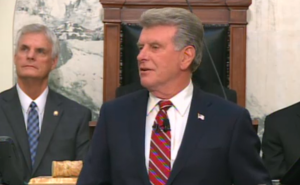On Monday, Gov. Butch Otter made K-12 the focal point of his ninth State of the State address — and the centerpiece of his 2015-16 budget proposal.

Otter proposed a $101.2 million increase in the K-12 general fund — a number designed to bring the budget back above its pre-recession levels. That 7.4 percent increase will draw scrutiny, just because of the size of it. But many other policy debates will branch off from the governor’s budget proposal.
Here’s the short list:
Teacher pay and teacher licensing. Nearly $32 million of the K-12 increase would go toward starting to fund a career ladder, boosting the pay for nearly 5,000 teachers at the low end of the salary scale, and launching a five-year initiative to boost salaries across the board.
But Otter says the $175 million pay raises are predicated on rewriting the way teachers are licensed — and a tiered licensure plan that has drawn opposition from the teaching community. Otter’s speech Monday focused on the cash his plan would infuse into the pay schedule; the debate over the plan will likely center on the way teachers are evaluated, and how they move through a fundamentally rewritten licensing structure.
Idaho Education Network. Otter wants to save the statewide high school broadband system, calling it “an asset that must be maintained.” To do it — and try to secure federally administered funding that has been in limbo for nearly two years — he says it’s time to start over.
Otter says the state needs to rebid the disputed $60 million project contract — the deal orchestrated in 2009 by one of Otter’s closest confidantes, then-Administration Department Director Mike Gwartney. Otter’s speech was by no means a stinging rebuke, but an admission of a flawed process. “We have learned that even the best intentions and plans must be carried out with equal attention to detail and public perceptions.”
Otter’s decision to sever ties on the contract was well-telegraphed. Last week, he told reporters he was blindsided by problems with the Idaho Education Network and private prison contracts. And Otter’s point man on the broadband mess, former Senate Education Committee Chairman John Goedde, told a state committee that a rebid was in the works.
However, the Otter team will have to convince lawmakers to cough up another $8.9 million to keep the network online through June 2016 — all while answering questions about the rebid, the state’s resounding loss in District Court in November and the long-term funding prognosis.
Spending priorities. Here’s the quick math. Otter wants to grow his overall budget by 5.2 percent, pushing the general fund over the $3 billion mark. But K-12 would get a 7.4 percent increase.
That means the other half of the budget — the budget that doesn’t go to K-12 — needs to be held to roughly a 3 percent increase. Otter wants to hold the Department of Health and Welfare to a 2.8 percent increase, while adult and juvenile corrections would get a 2.3 percent increase. For years, these have been the “cost drivers” in the state budget, growing far more rapidly than K-12 or higher education (which would receive a 3 percent increase under Otter’s plan).
Can the state reverse two decades of budget trends and make this spending shift work?
Tax policies. Something of a mixed bag. Otter opened the door to taxing Internet sales, a possible funding source for K-12. Otter also built in a proposal for tax relief. Corporate income taxes and top-end personal income tax rates would drop from 7.4 percent to 7.3 percent — part of a five-year plan to reduce these rates to 6.9 percent.
Otter is working a delicate balance here. Terreton Republican Jeff Siddoway, chairman of the Senate Local Government and Taxation Committee, says he will not consider tax relief unless he believes the Legislature has fixed education funding. But Otter’s tax proposals drew fire from Wayne Hoffman of the conservative Idaho Freedom Foundation; on Twitter, he criticized the Internet tax idea and said Otter’s income tax plan is “lackluster, at best.”
Transportation. Revisiting his most resounding legislative setback from his first term, Otter said the state needs to get serious about paying for infrastructure repairs. “This isn’t a matter of Hennie Penny telling us that the sky is falling. It’s a real problem.”
Otter didn’t propose a solution. However, he said he would oppose any attempt to siphon off general fund dollars for road repairs. The Idaho Transportation Department does not receive money from the general fund, and instead relies largely on federal and state gas taxes. But some legislators would like to apply taxes from auto parts sales to highway projects — a perennial idea that Otter said would pit road projects against education funding.
Does that set up another debate over increased gas taxes — an idea Otter pursued, to no avail, in 2009?
